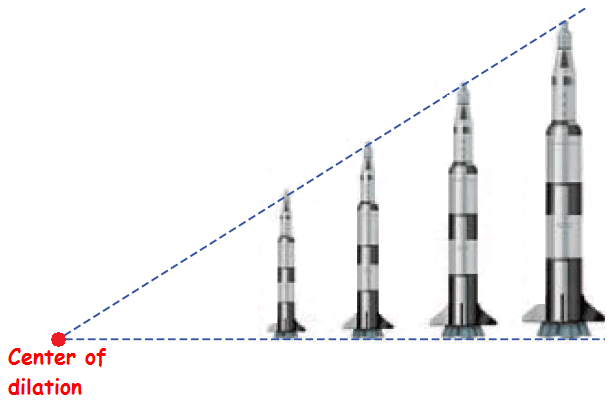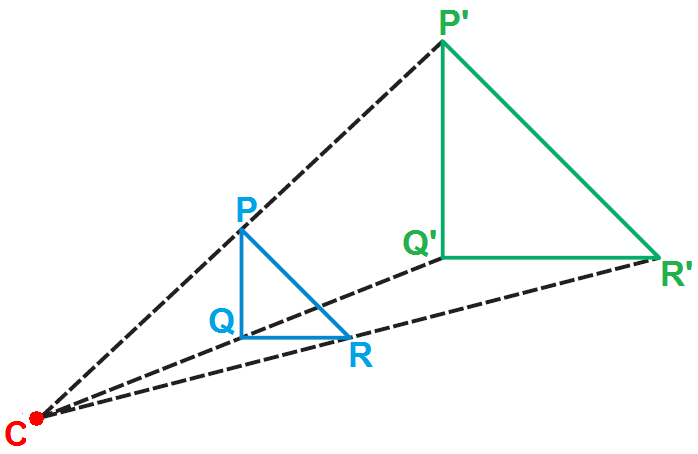PROPERTIES OF DILATIONS
Following are the properties of dilations.
When a figure is dilated -
(i) The image and pre image are the same shapes, but not the same size.
(ii) Angles are moved to angles of the same measure.
(iii) Parallel lines are moved to parallel lines.
(iv) The ratios of corresponding line segments are equal.
(v) The ratios of corresponding line segments give the scale factor.
(vi) The area increases by the scale factor required.
Exploring Dilations
Based on the properties of dilations given above, we can come to know more about dilations by exploring it.
A dilation is a transformation that moves each point on the original figure along a straight line drawn from a fixed point.
The point is called the point of dilation and the distance moved is determined by the scale factor used. Dilations produce figures that are the same shape as the original, but not the same size.
When the scale factor is greater than one, the dilation is called an enlargement.
When the scale factor is less than one, the dilation is called a reduction.
The toy models given below are scaled-down replicas of the Saturn V rocket that powered the moon flights. Each replica is a transformation called a dilation.

Unlike the other transformations we have studied — translations, rotations, and reflections — dilations change the size (but not the shape) of a figure.
Example
Triangle P′Q′R′ is a dilation of triangle PQR with scale factor 2. Point C is the center of dilation.

Step 1 :
Use a ruler to measure segments CP, CP', CQ, CQ', CR and CR' to the nearest millimeter. Record the measurements and ratios.
CP = 2.5 cm, CP' = 5 cm
CP'/CP = 5/2.5 = 2
CQ = 2 cm, CQ' = 4 cm
CQ'/CQ = 4/2 = 2
CR = 3 cm, CR' = 6 cm
CR'/CR = 6/3 = 2
Step 2 :
Write a conjecture based on the ratios in the table.
All the ratios are equal and it is 2. The distances are proportional.
Step 3 :
Use a ruler to measure segments CP, CP', CQ, CQ', CR and CR' to the nearest millimeter. Record the measurements and ratios.
PQ = 1 cm, P'Q' = 2 cm
P'Q'/PQ = 2/1 = 2
QR = 1 cm, Q'R' = 2 cm
Q'R'/QR = 2/1 = 2
PR = 1.4 cm, P'R' = 2.8 cm
P'R'/PR = 2.8/1.4 = 2
Step 4 :
Write a conjecture based on the ratios in the table.
All the ratios are equal and it is 2. The lengths are proportional.
Step 5 :
Measure the corresponding angles and describe your results.
The corresponding angles are congruent.
PQR and P'Q'R' are similar triangles.
Since the corresponding angles are congruent, it is clear that the dilations change size but not the shape.
Kindly mail your feedback to v4formath@gmail.com
We always appreciate your feedback.
©All rights reserved. onlinemath4all.com
Recent Articles
-
Trigonometry Reciprocal Identities
Apr 28, 24 10:10 AM
Trigonometry Reciprocal Identities -
IB Diploma Mathematics Problems on Exponents
Apr 28, 24 05:42 AM
IB Diploma Mathematics - Problems on Exponents -
Finding Vertex of a Quadratic Function Worksheet
Apr 27, 24 11:06 AM
Finding Vertex of a Quadratic Function Worksheet
